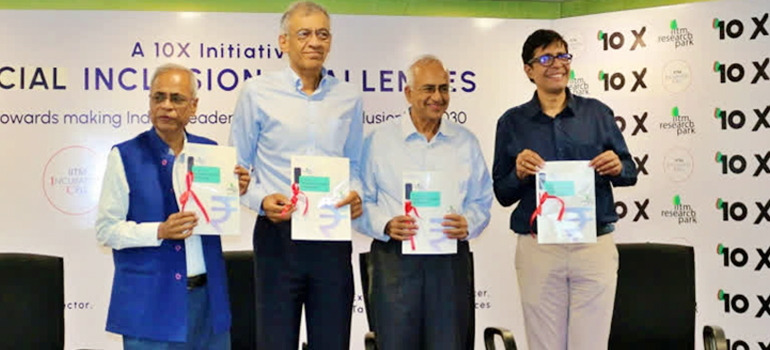
CHENNAI: Despite all innovation in financial services sector and the reinvention of payment systems by way of UPI platform and other tech in recent years, India society is heterogeneous and still reels from fundamental financial inequities, a recent report from IIT – Madras research park (IITMRP) has shown.
‘Financial Inclusion Challenges’, the report sets down the challenges faced by low-income groups and senior citizens in accessing financial services and recommends solutions. It was launched on Tuesday by industry veterans including Gopal Srinivasan, Chairman and Managing Director, TVS Capital Funds, S. Mahalingam, Ex-Chief Financial Officer, Tata Consultancy Services, V. Kamakoti, Director, IIT Madras and Ashok Jhunjhunwala, President – IIT Madras Research Park (IITMRP).
Among the key findings of the report is the recognition that Cash in Cash Out (CICO) needs to improve in the rural areas as currently an average rural customer lives around 4-5 kilometers from the nearest CICO point. “Individuals like kirana store owners, tradesmen etc. to function as Business Correspondents to reach the end customer, particularly in the remote parts of the country,” the report recommends. Similarly high quantum of banking charges (sometimes going up to even 60% of transaction value) for purely digital transactions like exceeding free number of transaction limit, insufficient balance, SMS updates etc, should be re-evaluated, it adds. The simplification of the KYC Process – which is currently cumbersome with requirements such as PAN, OTP or biometric verification- is another key recommendation made by the study.
The IITMRP leveraged on a large network of partner entities including various rural based fintechs and NBFCs in bringing out this report and said they will also work towards the inclusion goal with the partners. The growing proliferation of BSNLs 4G network in the rural areas and the country’s potential for growth of smartphone usage offers great optimism for better financial inclusion in India in the years to come, Gopal Srinivasan, chairman and MD, TVS Capital Funds, said.
“In a country with a population of 90 crore adults, only a small percentage has ever made (at least one) digital transaction. Despite our achievements in financial services sector, a large section of the Indian society is still struggling with fundamental financial inequities,” Ashok Jhunjhunwala, President, IITMRP and IITM Incubation Cell & RTBI, said. “We are confident, the authorities and administrative leaders will find this report a ready reckoner for bringing policy changes that will positively impact and enable India to truly become a leader in financial inclusion,” he added.
The study is the first step toward IIT Madras Research Park and IITM Incubation Cell’s ambitious nation building 10X program. Kicked off around 2 years ago, 10X initiative aims to make India a global leader in certain specified areas by 2030, and some of its goals include achieving net zero, promoting assistive technologies and moving towards financial inclusion among others.
Original News Link
https://www.iitm.ac.in/happenings/press-releases-and-coverages/iit-madras-research-park-analyses-how-inclusive-fintech-new